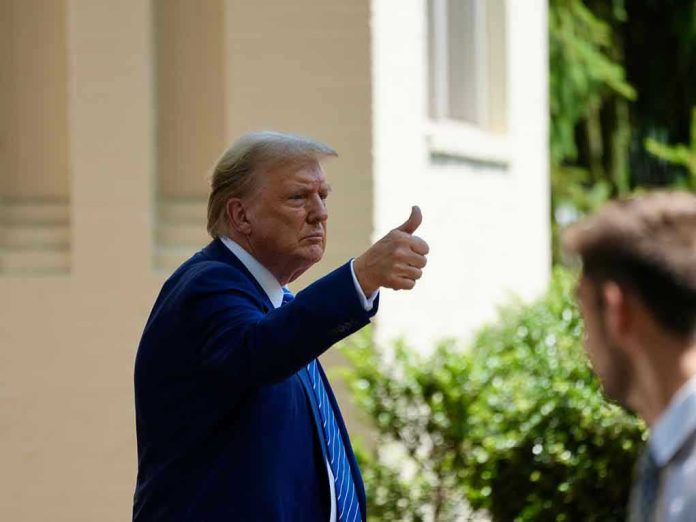
A new strategy by President Trump uses innovative tactics against transnational crime, leaving leftist critics outraged.
Story Highlights
- Trump administration releases video of a tactical operation against Tren de Aragua.
- U.S. forces employ a “reverse terror attack” strategy to combat criminal networks.
- Legal challenges arise over the use of the Alien Enemies Act.
- Public and political debates intensify around executive power and border security.
Trump’s Bold Move Against Transnational Crime
The Trump administration has declassified a video depicting an operation where U.S. authorities intercepted a vessel linked to the Venezuelan criminal syndicate, Tren de Aragua (TdA). This operation, described as a “reverse terror attack,” showcases the U.S. military employing tactics typically used by terrorist organizations to disrupt criminal activities. This unprecedented approach has garnered significant attention as it reflects a shift toward more aggressive measures in combating transnational crime.
Legal and Political Repercussions
A federal appeals court recently blocked President Trump’s attempt to use the Alien Enemies Act to deport alleged members of TdA, arguing that the act was not intended for criminal groups. This legal setback highlights the complexities and challenges in applying century-old statutes to modern-day transnational crime. The administration plans to appeal the ruling, potentially escalating the matter to the Supreme Court. This legal battle underscores ongoing debates over the scope of executive power in addressing foreign criminal threats.
Implications for U.S. Policy and Security
The use of military assets in a law enforcement context marks a significant escalation in U.S. anti-crime strategy. The public release of the operation’s video serves as both a political statement and a deterrent to criminal organizations. However, this move raises questions about the militarization of domestic security policies and their implications on civil liberties. While supporters view this as a necessary show of strength against transnational threats, critics warn of potential legal overreach and the blurring of lines between military and law enforcement roles.
Trump Gives TdA Terrorists a Taste of Their Own Medicine Using Brilliant 'Reverse Terror Attack' Strategy via @WestJournalism https://t.co/OI50uyUEgm
— Mike Hilbert (@29mhil) September 3, 2025
The impact of this strategy is likely to be felt across multiple sectors, with potential shifts in U.S. policy towards more militarized responses to transnational crime. This could lead to increased cooperation between law enforcement and military agencies, though it may also provoke further legal challenges as courts navigate these evolving frameworks.
Sources:







